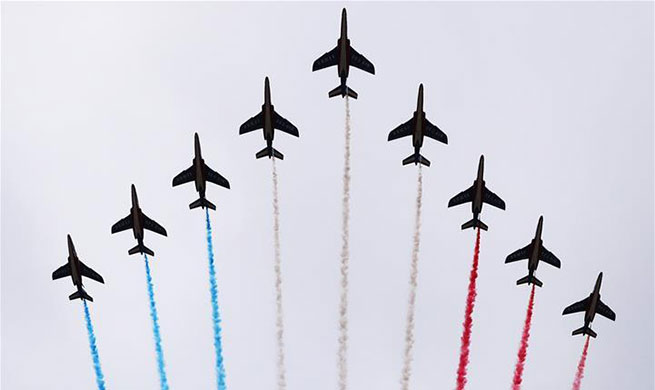LONDON, July 15 (Xinhua) -- Hosts England claimed their first-ever World Cup title against New Zealand here on Sunday, and did it in the most thrilling way possible.
After a low scoring game where the ball dominated the bat, both sides finished their innings tied with each other, with a super over required to settle the game.
Both sides bowled superbly throughout, in a game where the ball ruled the bat. The movement through the air and off the pitch early on in both teams' innings restricted the power hitting of both sides openers during the first powerplay.
During the New Zealand innings, the English pace attack showed immense discipline, bowling tight, almost test cricket lines of attack. With the ball moving through the air and off the Lord's pitch, the New Zealand top order had to bat sensibly and avoid throwing their hands through the ball for fear of nicking off.
This theme of discipline from the English bowlers and safety first for the Kiwi batsmen continued through the innings with each batsman getting in but being dislodged by a tricky ball or by ill thought out aggression.
When New Zealand finished their innings with just 241 on the board, England's superior batting attacking lineup looked certain to bring the World Cup home.
However, much the England innings followed the same theme of the ball overshadowing the bat. The opening spell from Matt Henry was one of the best displays of seam and swing bowling at this World Cup. Movement from the ball made work hard going for the superb opening pair of Bairstow and Roy, who had scored century partnerships together in the past four matches, however, after a number of jaffas from the opening bowler, he eventually got the explosive Roy caught behind.
Henry continued in the same vein for his ten-over stint, yet was not able to get another breakthrough but caused New Zealand to build immense pressure on the England top order that allowed Colin de Grandhomme, Lockie Ferguson and Jimmy Neesham to take the wickets of Root, Morgan, and Bairstow around him.
Despite strong resistance from Ben Stokes and Jos Buttler, the fall of Buttler saw the English tail collapse at a rate of knots, and by the time the final over came up England were shockingly 13 runs short of the total. Yet, after two sixes and a single later from the New Zealand born, English all-rounder Stokes, England tied the scores up and took the game to a super over.
A super over in cricket is used to separate and decide the winner of the game in the event of a tie. A relatively rare occurrence in itself, the capacity Lords crowd were treated to the almost unheard event of a tied super over. Batting first in the super over, Ben Stokes - who finished his first innings with 84 - was chosen to take on the over with power hitting wicketkeeper/batsman Jos Buttler, himself making a half-century in the previous innings.
Stokes and Buttler set New Zealand a total of 15 to win, with a three, single, four, single, two and a final four against bowler Trent Boult.
For the New Zealand super over, young paceman Joffra Archer was chosen to bowl to Jimmy Neesham and Marty Guptill. After the first ball, a wide yorker squirted down to long off off Neesham, Archer immediately increased pressure on himself bowling a wide in the second ball, leaving the New Zealanders needing only 11 from the bat to win. The next ball landed straight in Neesham's slot and was dispatched for six over deep midwicket. The six had tipped the balance in favor of New Zealand, yet the young fast bowler Archer showed nerves of steel during the next three balls, only conceding five, leaving the scores, once again, tied.
48 games and almost two months of solid cricket came down to this final ball. The young West Indian bowler Archer, the subject of much discussion before the tournament, only qualifying for England a month before the World Cup against Marty Guptill, the experienced hitter, who has been the glue and impetus at the top of the New Zealand order for so long.
The already tense atmosphere around Lords stiffened to an almost unbearable degree as the Archer began to stride in. Then the ball. A simple half volley, yet Guptill didn't get hold of it. The ball shot to Jason Roy at deep midwicket and the New Zealand batsmen set off, desperate to get to the other end to secure the World Cup. Roy, on the other hand, had to make one good throw to keeper Buttler to get the run out to secure England the World Cup. The fate of the World Cup rested on this one moment.
Roy fired the ball into the keeper and Buttler whipped the bails off to find Guptill short of the crease and run out. England had won the game and the World Cup. The super over tied, but England taking the game by virtue of the fact that they had hit more sixes as a side during the game.
Described as the best World Cup final of all time and one of the most exciting matches ever, England managed to raise the trophy for the first time in their history. Pre-tournament, England were regarded as favorites, however, a downturn in their form during the middle of the tournament saw them on the brink of elimination. Yet, a sublime backend of the tournament saw the hosts hit form at just the right time. This World Cup performance by England will inevitably find its way in English folklore.

















